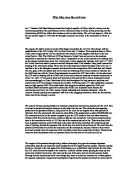The reason why the CCP won the battle for China by the end of 1949 and Mao Zedong emerged as the leader of the new Peoples Republic of China
Nathan Lu
The reason why the CCP won the “battle” for China by the end of 1949 and Mao Zedong emerged as the leader of the new People’s Republic of China
On 1 October 1949 Mao Chairman of the Chinese Communist Party stood in the old imperial palace in Beijing to proclaim the formal establishment of the New People’s Republic of China. Mao announced that from today on, the Chinese people have stood up. Historian Brian Gray claims that moment marked the victory of the Chinese communists won the battle of civil war with GMD and China was braced for a dramatic break from the past which was weak in many ways among the economic, social division, political system and war. At the same time, it also significant the end of China's half-century-long debate on which path China should take and what kind of country it should become. The 1911 Xinhai Revolution, led to the demise of the Qing Dynasty in 1911, to the establishment of the CCP in 1921, and then to the establishment of new China in 1949. In the past 38 years, the problems of China's economy, social division and the impact of war have led to the success of CCP and Mao in China.
Economic :
In terms of economy, causation of the failure of the Opium War in the Qing Dynasty and the Boxer Movement, western countries occupied concessions in China, controlled import and export taxes, dominated trade and expanded missionary activities. For example, Russia is in the north, and Germany is in Shandong and Qingdao. After these failures, consequence China gradually lost it's economic and sovereignty over the country. After the revolution of 1911, Sun Yat-Sen and other GMDs issued the three people's principles, which are nationalism, socialism and democracy, trying to expel foreigners, let Chinese own China, and create better living and economic conditions and save China. But GMD is hampered by the cruel fact that the Chinese people make a living by working in the prosperous diplomatic and commercial institutions in the concession area. Historian Margot Morcombe believes that the dependence of the Nanjing government on foreigners, especially in terms of economy and finance, is one of the major problems hindering the realization of China's independence advocated by the "three people's principles". Nanjing government continued to be most powerful to the demands of foreign countries and nearly 60 million people are unemployed. Also because 80% of Chinese people are farmers. The poverty of rural farmers is more serious. The landlords' control and exploitation of farmers have not been solved by GMD. Significance, in 1934-1935, a large-scale famine occurred in China, killing 30 million Chinese people but the Nanjing government still decided to spend 80% of government spending on the army, because Nanjing government leader Jiang believes that the Communist Party is China's heart disease and needs to give priority to solving them. Also, since 80% of GMD's finance comes from the rich in Shanghai and Zhejiang, GMD's economic policy can only be biased towards capitalism. However, The Nanjing government has indeed made many good economic improvements, such as establishing the central bank and obtaining many foreign debts. However, the economic goal of the CCP under Mao Zedong's leadership is more in line with Sun’s three people's principles. CCP also aspires to the independent from foreign domination of the Chinese people, and Mao hopes that China has more than Germany, the Soviet Union, industry and agriculture equivalent to the USA. At the same time, because Mao is a Marxist and socialist, his economic policies in China's Soviet areas such as Yanan Soviet Area focused on equality which means equal outcomes and equal wealth, and no one can private land, and all profits are distributed by the state. Moreover, due to Mao's excellent military capability and the support of Zhou and other major figures, Mao became the leader of the CCP at the Zunyi Conference of the long march in 1935. At the same time, CCP also carries out education for farmers to support CCP from the bottom of their hearts. As historian Michael Lynch said, CCP's policies are sensitive to farmers' needs and make them truly satisfied. Compared with GMD's economic policies, although they have helped the progress of China's economic environment, CCP's policies will solve the living problems of a larger part of Chinese farmers, and also a consequence of the large CCP's Red Army after the war of resistance against Japan with GMD.








